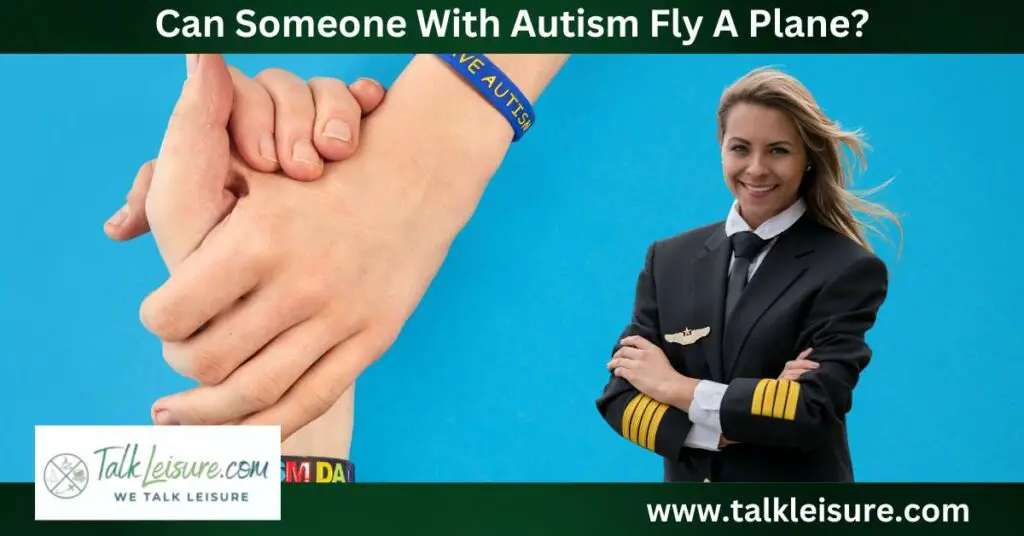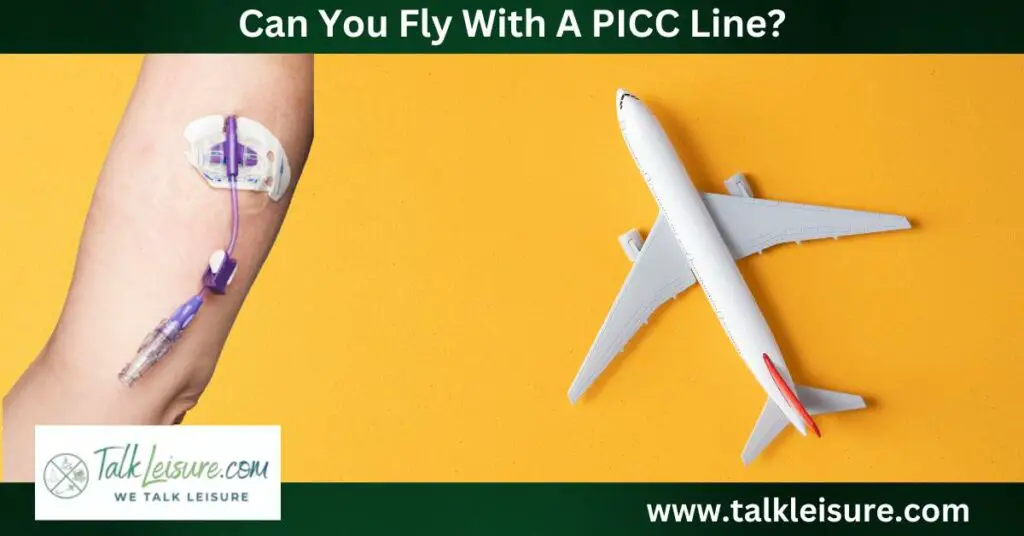Many people with autism spectrum disorder (ASD) have unique abilities and talents that can be valuable in various fields.
However, specific considerations must be taken into account when it comes to professions such as piloting an aircraft.
This article will explore whether someone with autism can fly a plane and discuss the factors involved in making that determination.
The ability of someone with autism to fly a plane is complicated and depends on several variables.
An individual with autism can become a pilot. However, there are several things to take into account.
Read this blog to know whether an autistic person can fly a plane.
What Is Autism Spectrum Disorder?
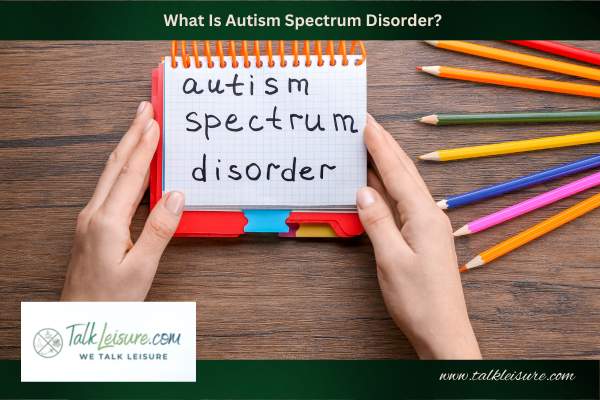
Autism spectrum disorder (ASD) is a developmental disorder that affects communication, social interaction, and behavior.
It is a lifelong condition, and individuals with ASD may experience many symptoms and challenges.
Each person with autism is unique, and their abilities and limitations can vary greatly.
To better understand ASD, it is essential to recognize that it’s a spectrum disorder, meaning individuals can experience different levels of impairment in areas such as:
- Social interactions and communication
- Sensory sensitivities
- Repetitive behaviors and restricted interests
- Cognitive abilities
Now that we have a general understanding of autism spectrum disorder, let’s delve into whether someone with autism can fly a plane.
Are Pilots Tested For Mental Health?
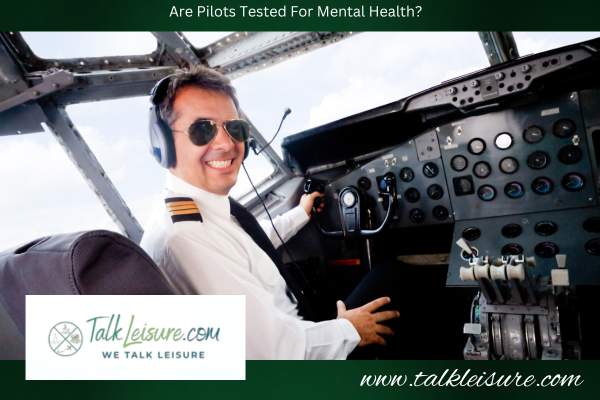
When it comes to pilot training, the mental health of aspiring pilots is an important consideration.
The aviation industry recognizes the significance of mental health in pilot performance and safety.
Pilots undergo medical evaluations, including mental health assessments, as part of the training process.
During these assessments, pilots are evaluated for mental health conditions or issues that could affect their ability to operate an aircraft safely.
These assessments are conducted by qualified aviation medical examiners trained to identify and address mental health concerns.
Can Someone With Autism Fly A Plane?
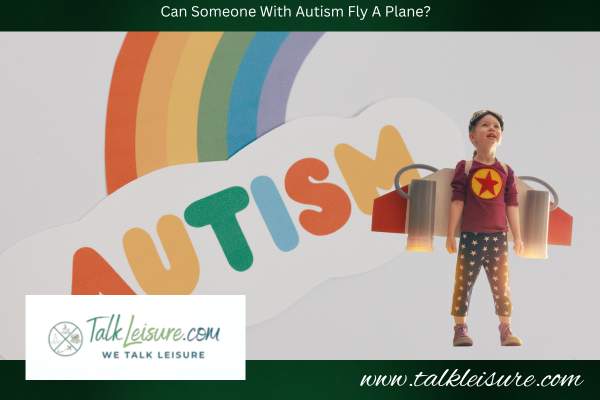
Autism is a neurodevelopmental disorder that affects social interaction, communication, and behavioral patterns.
Whether someone with autism can fly a plane is complex and depends on various factors.
While autism does not automatically disqualify someone from becoming a pilot, certain considerations must be considered.
The aviation industry prioritizes safety and requires pilots to meet specific medical and psychological criteria to perform their duties effectively.
Individuals with autism interested in pursuing an aviation career may need a comprehensive assessment to determine their eligibility.
This assessment may involve evaluating the severity of autism symptoms, cognitive abilities, communication skills, and social interaction capabilities.
The Federal Aviation Administration (FAA) in the United States has guidelines for assessing pilots with autism.
They consider factors such as the severity of symptoms, the ability to communicate and adapt to changing circumstances effectively, and the absence of any comorbid conditions that could impact safety.
It’s important to note that each case is evaluated individually, considering the aspiring pilot’s unique characteristics and abilities.
Some individuals with autism may meet the necessary criteria and be able to pursue a career as a pilot.
In contrast, others may face limitations due to the nature and severity of their symptoms.
What Are The Initiatives And Programs Supporting Individuals With Autism In Aviation?
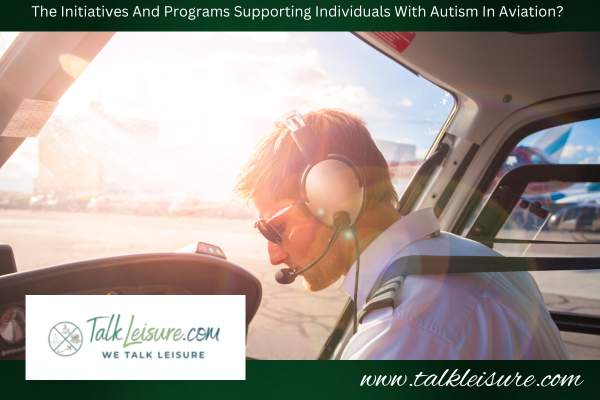
In recent years, there has been a growing number of initiatives and programs aimed at supporting individuals with autism who are interested in pursuing careers in aviation.
These programs provide valuable resources and training and help raise awareness and promote inclusivity within the industry.
Here are some notable initiatives and programs:
The Autism Aviators Program
This program, developed by the Organization for Autism Research (OAR), focuses on providing aviation-related resources and support for individuals with autism.
It offers a comprehensive guide, online forums, and training materials to help individuals with autism navigate the aviation industry.
Wings For Autism
The Wings for Autism program allows individuals with autism and other developmental disabilities to experience flying in a safe and controlled environment.
This program aims to familiarize individuals with the sensory aspects of air travel and reduce the anxiety associated with flying.
The Adaptive Pilot Program
This program, offered by the National Autism Association, provides specialized flight training for individuals with autism interested in pursuing an aviation career.
It focuses on developing skills necessary for piloting an aircraft, such as communication, decision-making, and problem-solving.
What Is The Importance Of Individualized Assessments For Individuals With Autism Pursuing Aviation Careers?
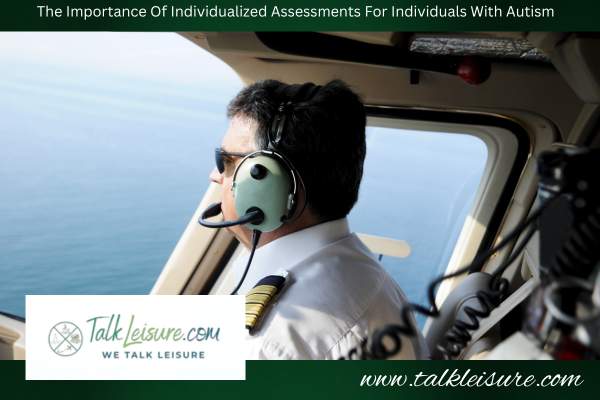
Individualized assessments play a crucial role in supporting individuals with autism who are interested in pursuing aviation careers.
These assessments allow professionals to evaluate an individual’s strengths, interests, and specific challenges related to autism.
Here are some reasons why individualized assessments are important.
Identifying Strengths And Abilities
Individualized assessments help identify the unique strengths and abilities of individuals with autism.
This information is valuable for determining the most suitable roles within the aviation industry and tailoring training programs to maximize their potential.
Addressing Challenges And Accommodations
Autism is a spectrum disorder, and individuals may have diverse challenges and sensory sensitivities.
Individualized assessments can identify specific challenges, and appropriate accommodations and strategies can be developed to support individuals in their aviation careers.
Personalized Training Programs
Individualized assessments enable the development of personalized training programs that consider an individual’s specific needs and learning styles.
This ensures that individuals receive the necessary support and resources to succeed in their aviation pursuits.
However there may be limitation on autistic pursing private pilot license (PPL). For example, with a PPL they might not be able to travel anywhere.
Building Confidence And Self-Efficacy
Individualized assessments build confidence and self-efficacy by recognizing an individual’s strengths and providing targeted support.
This, in turn, enhances an individual’s motivation and determination to pursue their chosen aviation career path.
The aviation industry must continue prioritizing inclusivity and support for individuals with autism.
Through initiatives, programs, and individualized assessments, we can create a more diverse and welcoming environment that allows everyone, regardless of their neurodiversity, to pursue their passion for aviation.
How Can Flying Benefit Individuals With Autism?
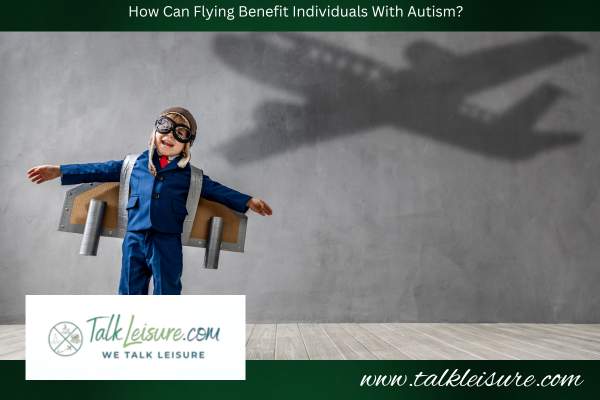
There are several ways in which flying can benefit individuals with autism.
Structure And Routine
Flying requires adherence to strict procedures and protocols, providing a structured and predictable environment.
This can provide security and comfort for individuals with autism who thrive on routine and predictability.
Specialized Careers
The aviation industry offers a range of specialized careers, particularly suitable for individuals with autism.
These include roles as pilots, air traffic controllers, aviation mechanics, and aviation engineers.
The focus on technical skills, attention to detail, and adherence to protocols in these careers can align well with the strengths and interests of individuals with autism.
Social Interaction
While the aviation industry may not be the first sector that comes to mind when considering social interactions, it offers opportunities for individuals with autism to engage with others in a structured environment.
Whether working as part of a flight crew or interacting with passengers, these interactions can contribute to developing important social skills.
In contrast, when someone flying with an autistic kid on play they are encourage to carry toys (autism sensory toys), carry-on bag with medicine and extra clothes, etc.
Sensory Stimulation
Flying exposes individuals with autism to various sensory experiences, such as the sound of engines, the feeling of being in the air, and the visual stimuli of a new environment.
This exposure can help individuals with autism build resilience to sensory overload and develop coping strategies for managing different sensory inputs.
Overall, flying can offer numerous benefits for individuals with autism.
From inspiring success stories to career opportunities and personal growth, the aviation industry provides a unique environment that can accommodate the strengths and needs of individuals with autism.
With the right support and opportunities, individuals with autism can thrive and make valuable contributions to aviation.
Conclusion
In conclusion, while there are individuals with autism who have successfully become pilots, the ability to fly a plane with autism can vary depending on the severity of the condition and individual capabilities.
It is important to note that aviation authorities and regulations have strict requirements for pilots to ensure the safety of passengers and crew.
These requirements include certain cognitive and psychological abilities that may pose challenges for individuals with autism.
However, with the proper support, accommodations, and training, some individuals with autism may be able to pursue a career in aviation and fly a plane.
Potential pilots with autism must undergo comprehensive assessments and evaluations to determine their suitability and capabilities.
It is worth mentioning that some organizations and programs specifically focus on providing support and training for individuals with autism who aspire to become pilots.
These organizations aim to create opportunities and break barriers for individuals with autism by offering specialized training programs tailored to their unique needs and strengths.
Providing the necessary accommodations and support, these programs help individuals with autism develop the skills and confidence to pursue their dreams of flying.
FAQs
Can You Be A Military Pilot With Autism?
In military aviation, individuals with autism as pilots are currently not supported due to stringent military requirements and regulations.
The military has specific medical standards and criteria that individuals must meet to be eligible for pilot training and service.
These standards are in place to ensure the safety and effectiveness of military operations.
Individuals with autism may find it challenging to meet these standards.
Particularly in terms of communication, social interaction, and specific cognitive abilities required for military aviation.
Overall, while the possibility of individuals with autism flying planes exists, the specific opportunities and limitations vary depending on the severity of the condition, individual capabilities, and the specific aviation sector.

